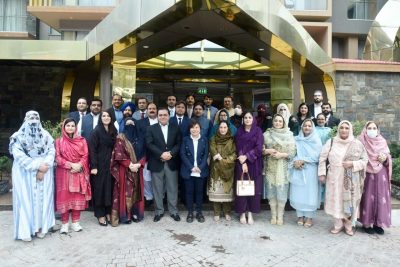
Empowering Democratic Leadership through Legislative Capacity Building
The Pakistan Institute for Parliamentary Services (PIPS), in collaboration with UN Women, hosted the New Members Orientation Programme for the newly elected Honourable Members of the Provincial Assembly of Khyber Pakhtunkhwa at Ramada Hotel, Murree. This high-level initiative brought together parliamentary experts and development partners to equip the newly elected members with a series of sessions aimed at strengthening democratic governance and inclusive lawmaking.
The programme opened with welcome remarks by Mr. Asim Khan Goraya, Executive Director PIPS, who emphasized the importance of equipping new members with the tools and knowledge needed to begin their parliamentary journey with confidence. He expressed sincere appreciation for the support of institutional partners, particularly UN Women and UNDP, whose continued efforts in promoting inclusive and gender based legislation remain invaluable. This was followed by opening remarks from Ms. Jacqui Ketunuti, Deputy Country Representative UN Women, and Mr. Rana Kaiser Ishaque, Assistant Resident Representative, UNDP. They appreciated the long term efforts of PIPS for parliamentary excellence and committed to coordinated events in future. Mr. Taj Muhammad, Director (PDP & C), PIPS, presented the programme overview.
The main objective of this orientation was to equip newly elected members with essential knowledge and tools to perform their legislative duties effectively.
Mr. Sheikh Sarfraz Ahmed, Parliamentary Expert, led two foundational sessions: An Overview of the Constitution of the Islamic Republic of Pakistan and Legislative Process: From Bill to an Act, highlighting the constitutional framework and stages of lawmaking.
During the session, the moderator expressed heartfelt gratitude to the Honourable Members of the Provincial Assembly of Khyber Pakhtunkhwa for attending the orientation despite the ongoing flood crisis in parts of the province —acknowledging the Members’ dedication to public service in challenging times. The participants offered prayers for the safety and recovery of those affected.
Hon. Ms. Naeema Kishwar, Member National Assembly, facilitated an engaging session on The Role of Women Parliamentary Caucus Khyber Pakhtunkhwa in Gender Responsive Legislation. She commended the Pakistan Institute for Parliamentary Services for its continued support in promoting quality legislation and empowering the members of all legislatures in Pakistan to drive inclusive reforms. She sincerely invited the members to avail the platform of PIPS to become more effective and impactful legislators.
The last session of the day was on Rules of Procedure and Conduct of Business of the Provincial Assembly of Khyber Pakhtunkhwa, conducted by Mr. Hidayatullah Khan, Additional Secretary, KP Assembly who apprised the members about the new amendments in the Rules of Procedures and Conduct of Business of the Provincial Assembly of Khyber Pakhtunkhwa.
On the next day the fifth session of the orientation programme focused on the crucial subject of Parliamentary Oversight Tools, which serve as the foundation of transparency and accountability in democratic governance. The session was facilitated by Mr. Muhammad Anwar, Parliamentary Expert and former Secretary, Senate of Pakistan, who drew upon his extensive parliamentary experience to guide the participants.
The sixth session was dedicated to Parliamentary Committees: Powers and Functions. Described as the mini-parliaments, parliamentary committees are a powerful tool for overseeing the working of the government. The session was facilitated by Ms. Rabeea Anwar, Additional Secretary, Senate of Pakistan, who provided an in-depth overview of the pivotal role committees play in strengthening parliamentary performance.
In his closing remarks, Executive Director PIPS Mr. Asim Khan Goraya expressed gratitude to the participants for their active engagement throughout the orientation. He noted that the newly elected members’ thoughtful questions and discussions on parliamentary oversight and committee functions reflected their strong commitment to their constitutional responsibilities.